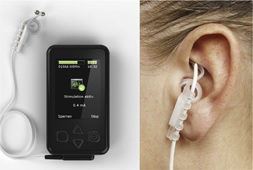Cardiovascular effects of auricular stimulation – and auricular acupuncture
Kristen Sparrow • October 01, 2023

 Readers may be aware that I’ve been using transcutaneous vagal nerve stimulation in the clinic, usually with heart rate variability monitoring. It can increase vagal “rest-and-digest” activity, lowering anxiety, blood pressure and anxiety and improving mood. It’s also been studied for cardiac effects.
Readers may be aware that I’ve been using transcutaneous vagal nerve stimulation in the clinic, usually with heart rate variability monitoring. It can increase vagal “rest-and-digest” activity, lowering anxiety, blood pressure and anxiety and improving mood. It’s also been studied for cardiac effects.
The number of studies on auricular stimulation (AS) techniques, including transauricular vagus nerve stimulation and auricular acupuncture, has grown significantly in the past 30 years. This review examined the cardiovascular effects of AS by analyzing data from various databases. Of the 78 trials reviewed, results showed that AS significantly reduced heart rate (HR) without adverse reactions and decreased the LF/HF ratio in heart rate variability (HRV), suggesting increased vagal activity. However, other cardiovascular parameters remained unchanged. AS had minimal side effects in all studies. In conclusion, AS safely reduces HR and affects HRV, but more research is needed to determine its potential for treating conditions like tachycardia or autonomic imbalance.
Abstract
Background: The number of randomized controlled trials using auricular stimulation (AS) such as transauricular vagus nerve stimulation, or other auricular electrostimulation or auricular acupuncture or acupressure, in experimental and clinical settings, has increased markedly over the last three decades. This systematic review focusses on cardiovascular effects of auricular stimulation.
Methods and analysis: The following databases were searched: MEDLINE (PubMed), EMBASE, Cochrane Central Register of Controlled Trials (CENTRAL), ISI Web of Science, and Scopus Database. RCTs were reviewed that had been published in English and European languages. Data collection and analysis was conducted by two reviewers independently. Quality and risk assessment of included studies was performed and the meta-analysis of the effect of the most frequently assessed biomarkers.
Results: Altogether, 78 trials were included. 38 studies assessed heart rate (HR), 19 studies analyzed heart rate variability (HRV), 31 studies analyzed blood pressure (BP) and 7 studies were identified that measured oxygen saturation (O2), 2 studies on baroreflex sensitivity and 2 studies on skin conductance were evaluated in this review. 26 studies contained continuous data and were eligible for meta-analysis, 50 trials reported non continuous data and were evaluated descriptively. The overall quality of the studies was moderate to low. AS leads to a significant reduction of HR, the changes though were not considered an adverse reaction. Furthermore, when looking at HRV, AS was able to reduce the LF/HF ratio significantly compared to control procedures. No other cardiovascular parameters (blood pressure, oxygen saturation, baroreflex sensitivity) were changed significantly. AS produced only minor side effects in all trials.
Conclusion: AS can lead to clinically safe reduction of HR and changes in the LF/HF ratio of the HRV, which is presumably via an increase in vagal activity. More research is needed to clarify whether AS can be used to modulate tachycardia or indications with autonomic imbalance.
Systematic review registration: https://www.crd.york.ac.uk/prospero/display_record.php?RecordID=231885 PROSPERO, ID CRD42021231885.
Keywords: auricular acupuncture; auricular stimulation; cardiovascular; randomized controlled trials; systematic review; transauricular vagus nerve stimulation.

